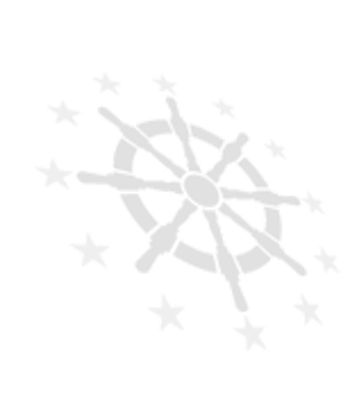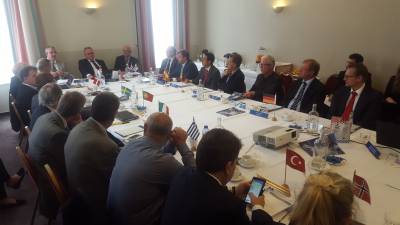Restrictions and lockdowns are introduced, cancelled and then reintroduced at a moment’s notice. One day the world rejoices at the mention of positive news about a vaccine, the next we get to read about a new mutation that shatters our current plans to combat this common enemy.
Considering the implications of COVID-19, you could argue that “uncertainty” is the common theme of our time. We all share the feeling that our capability of planning ahead has been taken away from us. In my opinion, it’s imperative that we overcome this feeling and do what we can to improve because the future is coming in one shape or another.
The question for us, the European community of ship supply, is what we want to achieve in the next decade. How do we modernize our organizations, ideals, intentions and goals?
How does modernization differ from development and progress?
Suggesting that something needs to be modernized implies that the thing, in its current state, lags behind if you compare it to the social-economic state of its surroundings and counterparts.
The process of modernizing an organization can’t be defined as simple improvements in different parts. It requires long-term action, and the result must be large-scale changes in ideology, procedure and function. The same would, of course, also apply to an industry made up of thousands of organizations. To begin our journey of modernization, we must first identify the destination, what is considered to be, and to become, “modern”. How do we set a course to align our values, vision and the direction of our community with our destination?
My opinion is that we modernize by acting on three different areas of progression: Environmental initiatives; diversification; and digitalization. To make sure our focus is correct, I will try to explain and evaluate the sense of priority, relevance and ethics of the propositions. Keep in mind that I do not propose we introduce actions that would replace any work that OCEAN is doing today, what I suggest in this article are things I think we need to pay attention to as well (not ’instead’).
Environmental Initiatives
The fight against climate change is present in almost every part of our society. European nations, industries and people may have different opinions on severity and how the threat should be handled but the undeniable scientific consensus is that we need to act strong and with a proactive mindset.
Ship suppliers provide a number of different services to the maritime industry which is a substantial source of pollution and therefore puts the industry under enormous pressure to face this challenge. With that in mind it is wonderful to see that ship owners around the world take the matter very seriously. They have understood that to carry on they have to be innovative and revolutionize their entire industry.
If we as a service provider to this industry fail to follow the initiative of our customer base it will damage the relationship between us. If the leading entities of an industry prioritize environmental innovation and then realize that their service providers do not, the latter will face the consequences.
In addition to being the biggest threat to our way of life and the main focus of our customer base, OCEAN has to realize that our most common counterpart, the European Union, will weigh in environmental awareness when they interact with organizations that request assistance and make demands.
The EU has a target of reducing greenhouse gas emissions by at least 55% by 2030, and by 2050 Europe aims to become the world’s first climate-neutral continent. Following their lead is essential if we wish to stay relevant as an organization fighting for the rights of a European industry.
I can’t outline how environmental initiatives within the European industry of ship supply would look like specifically. I am, however, certain that our customers will expect us to provide them with solutions before they demand them.
The European community of ship supply needs to be a part of their journey, not an obstacle on the path to an environmentally friendly maritime industry.
Diversification by Inclusion
The maritime industry, including land-based service providers, is overwhelmingly composed of a homogenous work force and leadership structure. I refuse to believe that the reason is hostility towards others or ostracization of people that differ from the group, simply because I have spent a decade within this industry and have yet to encounter any situation even similar to that type of behavior.
With that being said, I do think that more can be done to actively diversify the group of individuals that make up our industry, especially regarding the ratio between men and women in leading positions of our organizations. I am not advocating that we should impose regulations for this, I see it as every organization’s choice to decide on how they want to handle this matter.
I am however very positive to any sort of initiatives that will make our industry more inclusive towards women. If we take OCEAN as an example, many of us will leave our positions between now and 2030 and by actively encouraging women to join, we could clearly indicate to our surroundings that ship supply is for everyone.
This is important for a number of reasons.
First of all, we are currently missing out on perspectives, capabilities and experiences found in 50% of the European population.
Furthermore, OCEAN represents a large number of companies and people. If our goal is to modernize and align with the rapidly changing world in which we engage, and that world has a clear heading towards diversification, then we need to keep up. Otherwise, our values, culture and intent will be questioned by our surroundings.
If you need more convincing, look no further than the EU’s stance on women in leadership positions, a part of their strategy Gender Equality 2020-2025.
The third area of progression, that I suggest would greatly assist in the modernization of European ship supply, concerns what we all could achieve if we work together regarding the digitalization of our industry and also what OCEAN could do to expand its function and strengthen its message.
Sharing data
European ship suppliers, with OCEAN on the front lines, are constantly struggling with new regulations that are being imposed on our industry. In many cases the solutions are not a source of income to the supplier, it is simply an obstacle we need to defeat in order to continue our work. Think of how much more effective we could be if we shared information and routines with each other on a much broader scale. We would of course need to include competition as a factor, making sure that the arrangement exists solely to solve a problem together and not generate advantages or disadvantages to any party.
Two recent examples come to mind: Tobacco Track & Trace and Inventory of Hazardous Materials.
The introduction of the Tobacco Track & Trace-system was quite confusing for the ship supplier as we did not really fit in to any category described by the regulation. When it was clear that we did in fact need to register our business interactions, some of us still didn’t really grasp what data points should be used in the system itself. OCEAN’s Working Group did a great job in clarifying the situation and it was eventually resolved, however, think of how much faster we would have identified discrepancies and solved practical issues if we simply had a platform to share real-life examples and explanations with each other in real time.
The regulation regarding Inventory of Hazardous Materials (IHM) just came into legal effect but has been a hot topic for our customers for much longer than that. Even if the regulation targets the ship owners, our industry was still indirectly affected since another responsibility of declaration was introduced. Generally, this was nothing more than another administrative burden for us, something that we need to solve along side our actual work of ship supply. What if we worked together in a much greater capacity here as well? What if we created a database with information such as templates of IHM-declarations regarding the most common products in our industry? If we had focused more on this problem one year ago and established a collective project, with a “Share data to access data”-basis, it would have been much easier for us to adapt to the IHM-regulation.
I would like to clarify that I don’t think OCEAN (or ISSA) has underperformed or done something wrong regarding these issues. Both organizations provided assistance, documentation, webinars and much more to help ship suppliers all over the world. My point is simply that a higher grade of efficiency could be achieved if we began to utilize the digital tools that are at our disposal.
Social Media
Continuing on the subject of digitalization, I would also like to suggest that OCEAN should have a presence in social media. It is undeniable that this phenomenon has become the loudest voice that organizations use to make themselves heard, not utilizing it is most likely a mistake.
There are a lot of different platforms, Facebook, Instagram, Snapchat, Twitter and so on. In my opinion the correct forum for OCEAN would be LinkedIn, a social media platform designed for interaction between individuals and organizations alike.
It’s very common for companies, interest groups, authorities and other parties to manage a LinkedIn-profile and OCEAN should be one of them. We could address current issues, interact with other organizations, publish news and much more. In addition, I think it would be pretty easy for us to establish strong network that can be utilized in various ways.
Summary
In this article I have tried to identify and highlight a number of things that I think OCEAN and European ship suppliers need to pay attention to in the coming years, mainly to adapt to the world around us and improve the situation for us as an industry. I hope that some things I’ve said have resonated with your thoughts on our common future together.


















